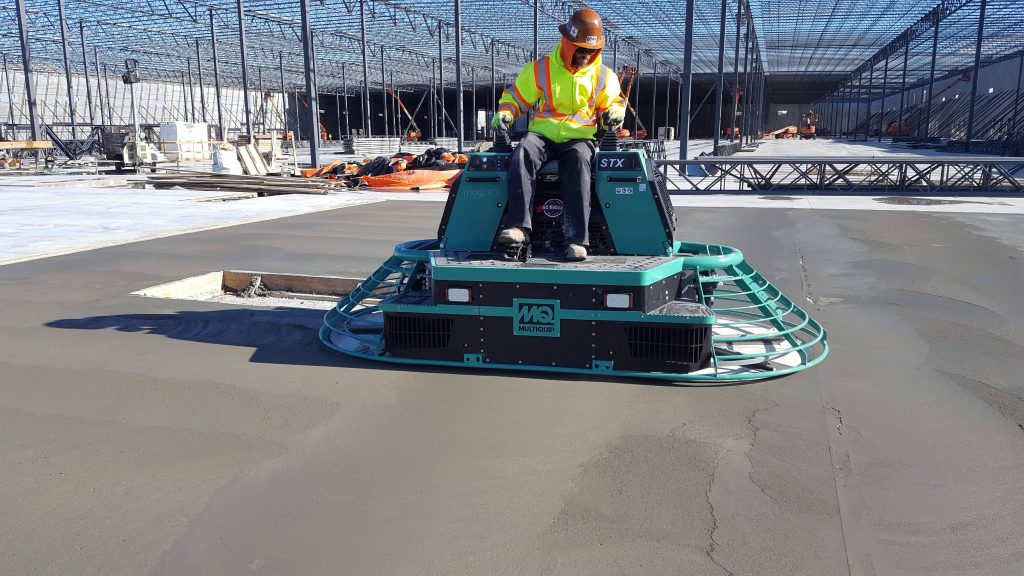When it comes to finishing concrete, one of the most efficient tools available is the power trowel. This essential piece of equipment not only speeds up the process but also provides a superior finish compared to manual troweling. However, knowing when to use a power trowel can significantly impact the quality of your work and the satisfaction of your clients.
What is a Power Trowel?
A power trowel, also known as a concrete trowel, trowel machine, or power float, is a machine used to finish concrete surfaces – so if you hear someone ask, what is a trowel machine, now you know that they’re referring to this piece of equipment.
Moreover, power trowels come in various types too – including walk behind power trowels and ride-on models – and each is suitable for different applications.
How does a power trowel work?
These machines operate by using rotating blades to smooth and polish the surface of the concrete, which helps to eliminate imperfections and provide a high-quality finish.
Take a look at Multiquip’s range of concrete finishing equipment here.
The Benefits of Using a Power Trowel
Using a power trowel offers several advantages over traditional manual finishing methods. Power trowels can cover large areas quickly, making them ideal for high-volume projects such as warehouses and car parks, and their use can increase productivity by up to 75%, allowing you to complete projects faster, and with less physical effort.
Moreover, compared to manual finishing methods, power trowels deliver a more consistent result that can really enhance the appearance of the concrete. The efficiency and quality they provide make them a worthy investment for contractors looking to elevate their work.
When to use a Power Trowel: Ideal Opportunities
There are specific situations where a power trowel truly shines, so, if you’re taking on a job that fits into one of the following categories, hiring one from Multiquip UK could really help you out:
- Large Surface Areas: For expansive projects like commercial floors or large driveways, power trowels can handle the workload efficiently.
- Specific Finishes: For polished concrete jobs, power trowels can achieve results that are difficult to replicate with manual tools.
Situations to Avoid
Now that you know when to use it, it’s also prudent to discuss when not to, as for all their benefits we’ve discussed, they aren’t suitable for all concrete finishing jobs. Scenarios where using a power trowel is not recommended include:
- Small Jobs or Tight Spaces: If you’re working on a minor repair or in a confined area, a manual trowel may be more appropriate.
- Uneven Surfaces: If the surface or terrain has significant variations in height, then it may not perform effectively.
- Specialty Finishes: Certain finishes require techniques that are better suited to manual finishing.
Understanding these distinctions can help you make informed decisions about your projects.
Factors to Consider When Deciding to Use a Power Trowel
Size of the Area
The size of the area you’re working on is a crucial factor in determining when to use this equipment. For larger projects, it saves considerable time, while smaller tasks may not justify the setup and operation.
Concrete Mix and Conditions
The type of concrete mix and environmental conditions also play a role. Certain mixes work better with power trowels, while conditions like temperature and humidity can affect the finishing process. Always ensure that the concrete is at the right consistency for optimal results.
Desired Finish
Consider the finish you want to achieve. Power trowels are excellent for creating smooth surfaces, but for some decorative finishes, manual techniques may still be necessary. Knowing the end goal will guide your decision.</span>
How to Use a Power Trowel Effectively
Preparation Before Use
Proper preparation is essential for effective operation. Before using the machine, inspect the site and ensure the concrete is at the right stage of curing. Make sure to follow safety protocols and regularly check the equipment for any issues.
Operating the Power Trowel
When operating, take your time to familiarise yourself with the controls. Start slowly, allowing the machine to float over the surface without applying too much pressure. This will help you avoid overworking the concrete.
Maintenance and Care
Routine maintenance is crucial to keep it in optimal condition. Regularly check and replace worn blades, and ensure the machine is cleaned after each use. Proper care will prolong the life of your equipment and ensure consistent performance.
Common Mistakes to Avoid
While us
While using a power trowel can greatly enhance your concrete finishing, several common mistakes can lead to unsatisfactory results. For instance, overworking the concrete can cause issues like dusting or surface cracking. Always use the appropriate trowel size for the job, and consider environmental factors to ensure the best outcome.
Conclusion
Understanding when to use it is essential for achieving high-quality concrete finishes. By recognising the appropriate situations for using a power trowel and considering various factors like job size and desired finish, you can enhance your efficiency and client satisfaction.</span>
For more information on selecting the right power trowel or to explore our range of other products in greater detail, feel free to contact us today!
